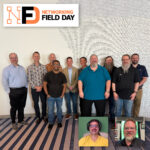|
|
This video is part of the appearance, “HPE Aruba Networking Presents at Networking Field Day 38“. It was recorded as part of Networking Field Day 38 at 10:30-12:30 on July 10, 2025.
Watch on YouTube
Watch on Vimeo
Marty Ma, Director of Product Management for HPE Aruba Networking’s CX switching strategy, presented on modernizing the virtualization stack with HPE Aruba Networking CX Switches. He introduced new products and recent integrations that unify HPE’s offerings. The CX switch portfolio, established in late 2016, now spans from 1 GBe to 400 GBe, all operating on a common software platform and managed by Aruba Central. This broad portfolio supports campus, branch, remote, access, aggregation, and core environments, as well as high-density data center deployments. A key innovation in late 2021 was the introduction of the first smart switch featuring a DPU (Data Processing Unit) from AMD Pensando, designed to bring services closer to the workload at the top of the rack. This was followed by the CX 10040, focused on 100 GBe server connectivity, both offering stateful Layer 4-7 services, East-West firewall inspection, and high-resolution telemetry.
Ma then linked this to the broader HPE GreenLake strategy, emphasizing the HPE Private Cloud Solution and HPE Private AI offerings, all orchestrated by HPE Morpheus software. He specifically highlighted Morpheus VM Essential, a next-generation virtualization management solution that unifies disparate hypervisor environments (like existing VMware ESXi clusters and KVM-based environments), all managed through a single pane of glass: HVM Manager. This aims to provide a more cost-effective alternative for customers concerned about rising hypervisor licensing costs. The overall HPE strategy positions them as a unique IT vendor capable of delivering a full hybrid cloud stack, with Morpheus for management and OpsRamp for comprehensive visibility across all environments.
The presentation underscored how the CX smart switching portfolio integrates with this virtualization strategy. Customers can leverage plugins to connect DPU-equipped switches into their hypervisor environments, enabling macro and micro-segmentation and advanced network services directly at the first-hop switch, even for bare-metal servers. This approach aims to simplify virtual networking across different hypervisors by offloading network policy enforcement to the hardware. The ongoing trend of increasing network speeds, driven by AI workloads, further validates HPE’s decision to integrate DPUs into switches, making the conversation about DPU placement more relevant than ever. The entire solution is designed to simplify complex end-to-end problems by providing a holistic view from compute and storage to networking, orchestrated and managed centrally.
Personnel: Marty Ma








